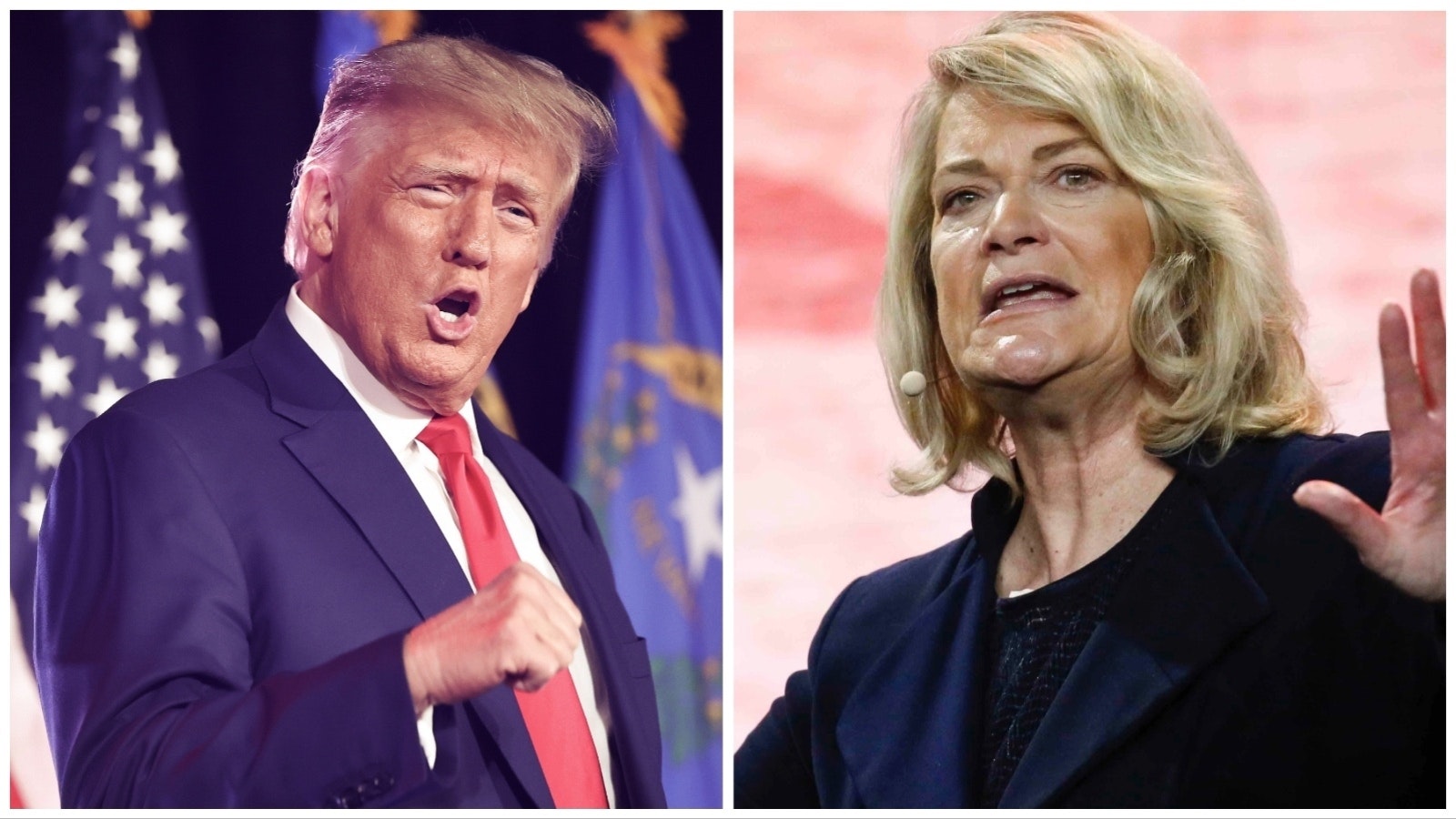A retired Laramie attorney is asking a state judge to bar former President Donald Trump and U.S. Sen. Cynthia Lummis from Wyoming’s election ballot in 2024 because of their actions after the 2020 presidential election.
Lummis is not scheduled for another election run, if she chooses, until 2026, however.
Tim Newcomb’s Nov. 1 filing against Wyoming Secretary of State Chuck Gray in the Albany County District Court accuses both Trump and Lummis of failing to defend the Constitution and of “adhering” to the nation’s enemies.
“Mr. Trump disqualified himself from appearing on Wyoming’s ballot when he refused to defend the Constitution’s transfer of presidential power,” wrote Newcomb in his filing. “Ms. Lummis disqualified herself from appearing on Wyoming’s ballot when she refused to count Pennsylvania’s electoral ballots to the electoral count.”
A Lummis spokesperson called the lawsuit “frivolous,” and an attempt to undermine the will of the voters.
“Any effort to remove candidates from the ballot is a direct attack on the freedom to choose their elected officials and undermines the integrity of our elections. Senator Lummis was elected to the United States Senate by more votes than anyone has ever received on a ballot in Wyoming history, so clearly voters in the Cowboy State believe she should be on the ballot,” wrote the spokesperson in a Tuesday email to Cowboy State Daily.
Secretary of State Chuck Gray, similarly, condemned the lawsuit as “wrong and repugnant,” and said he’s preparing a motion to dismiss the lawsuit, to stop what he deemed “blatant, radical attempts to interfere with Wyoming’s elections" and an undermining of the sanctity of the Constitution and the electoral process.
“We’re committed to protecting the integrity of our elections and ensuring that the people of Wyoming can choose who to elect for themselves,” Gray wrote in a Tuesday text message to Cowboy State Daily.
Both Gray and Lummis’ spokeswoman registered confusion with Lummis’ inclusion in the challenge since she’s not up for reelection in 2024.
Not Working Out Elsehwere
Newcomb’s is not the first legal challenge nationwide attempting to invoke Section 3 of the 14th Amendment to the U.S. Constitution to keep Trump off the ballot.
A federal court in Florida and the Minnesota Supreme Court have both dismissed such challenges. The U.S. Supreme Court last month declined to address whether the 14th Amendment disqualifies Trump from appearing on the ballot, a question that has sparked lively debate in legal circles.
Newcomb’s filing accuses Trump of coddling and colluding with Russian President Vladimir Putin.
It also discusses the Capitol riot of Jan. 6, 2021, and the events leading up to it, saying Trump prompted the riots by “spread(ing) lies that there had been outcome-determinative fraud in the election and that he had actually won.”
The filing quotes from testimonies and the final report given in Congressional hearings investigating the events surrounding Jan. 6, 2021, which said Trump sat idly when he could have stopped the riots.
“For the rest of the afternoon — as his country faced an hours-long attack — he hunkered down in or around the dining room, watching television,” the filing says, quoting from the final report of the panel that investigated the attack.
We Are Groot
Newcomb’s allegations contain several quotes and news stories. One paragraph reads: “We are Groot” and links to a YouTube video compilation of Marvel comic and movie hero Groot, a talking tree with superpowers.
Newcomb in a Tuesday interview with Cowboy State Daily clarified that the reference is meant as Constitutional commentary.
“So that (‘Guardians of the Galaxy’ movie) scene is, everyone is trying to survive and they’re surrounded by death and destruction, and then Groot grows these impenetrable branches around everyone to protect everyone,” said Newcomb. “And that’s the 14th Amendment.”
The 14th Amendment’s Section 3 says no person shall hold any U.S. or state civil or military office who, having previously taken an oath to support the Constitution as a legislator, “officer of the United States,” or executive or judicial officer of any state, “shall have engaged in insurrection or rebellion against the same, or given aid or comfort to the enemies thereof.”
A Letter From Lummis
Newcomb’s filing condemns Lummis’ Jan. 6, 2021, objection to certifying the electoral vote from Pennsylvania, saying the move should disqualify her from being on the Wyoming ballot.
“Ms. Lummis betrayed her oath – to her god – when she refused to count its electoral vote,” says the filing.
It also notes that Trump endorsed Lummis in her last election, and that Lummis and the other Wyoming delegates publicly rebuked the U.S. Department of Justice for indicting Trump.
Lummis, conversely, explained her certification objection in a Jan. 9, 2021, Cowboy State Daily op-ed, saying, “Let me be clear: my objecting to the certification of the votes in Pennsylvania could not have changed the outcome of the election. That was never my intent.”
She also condemned the violence of three days prior.
Wyoming’s Republican junior senator worried in her letter about the integrity of Pennsylvania’s new vote-by-mail statute, and a concern that Pennsylvania’s election law may have been applied unevenly by state officials, including signature verification and voter identification requirements.
“Even the Pennsylvania Supreme Court’s chief justice noted that one of the lawsuits in his state raised ‘troublesome questions about the constitutional validity of the new mail-in voting scheme,’” she said.
Lummis noted that 39% of Americans at that time polled believed the 2020 election “was rigged.” She also pointed to historical examples where congressional delegates questioned elections that looked suspicious, and to a federal law letting delegates address “questions arising” on elections.
Second Rodeo
Newcomb sued Wyoming in an earlier, separate filing April 27, 2022, that a state district court judge dismissed as failing to make a valid claim.
Newcomb will bring a new version of his lawsuit for the upcoming election cycle, he told Cowboy State Daily.
The 2022 lawsuit challenged a portion of the state’s election code that allegedly compelled voters to bring a form of identification to vote. Newcomb said he did not dispute having to present ID to register to vote, but he said having to bring ID again just before voting was an unconstitutional “trammeling” of Wyoming residents’ right to vote, and he asked District Court Judge Dawnessa Snyder to block the law’s enforcement.
Snyder declined to do so and dismissed the case, saying Newcomb didn’t show how he was allegedly harmed by the law or link it to any actual damages.
She also noted that the exact statute Newcomb targeted was a definitions or enumeration section describing the types of identification people can present just before voting, not a section that “prescribes … or proscribes conduct.”
Despite this, Newcomb was able to clarify in a hearing against the Wyoming Attorney General’s office that he was disputing the double mandate for presenting ID to vote.
“Following the hearing the Court does make out what appears to be an amorphous philosophical or theoretical question regarding a potential redundancy of having Wyoming voters make a presentation of identification when both registering to vote and again when voting,” wrote Snyder in her Feb. 14 order dismissing the case. “However, Mr. Newcomb provides no elaboration on the implications or harms of such presentation … or even if harm is likely to occur.”
Clair McFarland can be reached at clair@cowboystatedaily.com.





